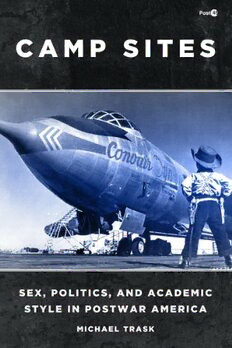
Camp sites : sex, politics, and academic style in postwar America PDF
Preview Camp sites : sex, politics, and academic style in postwar America
Camp Sites Florence Dore and Michael Szalay, Editors Post•45 Group, Editorial Committee Camp Sites Sex, Politics, and Academic Style in Postwar America Michael Trask Stanford University Press Stanford, California Stanford University Press Stanford, California © 2013 by the Board of Trustees of the Leland Stanford Junior University. All rights reserved. No part of this book may be reproduced or transmitted in any form or by any means, electronic or mechanical, including photocopying and recording, or in any information storage or retrieval system without the prior written permission of Stanford University Press. Printed in the United States of America on acid-free, archival-quality paper Library of Congress Cataloging-in-Publication Data Trask, Michael, 1967– author. Camp sites : sex, politics, and academic style in postwar America / Michael Trask. pages cm. — (Post 45) Includes bibliographical references and index. isbn 978-0-8047-8440-5 (cloth: alk. paper) - isbn 978-0-8047-8441-2 (pbk: alk. paper) 1. American literature—20th century—History and criticism. 2. Homosexuality and literature—United States—History—20th century. 3. Politics and literature—United States— History—20th century. 4. Literature and society—United States—History—20th century. 5. Camp (Style)— United States—History—20th century. 6. Politics and culture—United States—History—20th century. 7. Universities and colleges—Political aspects—United States— History—20th century. 8. United States—Social life and customs—1945–1970. I. Title. II. Series: Post 45. ps225.t73 2013 810.9'3587392—dc23 2012050735 Typeset by Bruce Lundquist in 10/15 Minion For Stephen, who makes life go best Contents Acknowledgments ix Abbreviations xi Introduction 1 1 The Schooling of America 19 2 Campus Novels and Experimental Persons 51 3 Liberal Perversion and Countercultural Commitment 85 4 From Impression Management to Expressive Authenticity 119 5 Deviant Ethnographies 149 6 Feminism, Meritocracy, and the Postindustrial Economy 181 Epilogue 219 Notes 233 Index 253 Acknowledgments I am grateful to Beth Hewitt and Jared Gardner, whose thorough attention to the various drafts of this book has made its final incarnation even possible. I am lucky that the best readers I know are also my best friends. Tony Scott has com- mented on many of the pages that follow; his example inspires and grounds my own thinking. At crucial stages of this book’s gestation, Jonathan Kramnick has provided advice as humane and sound as his friendship. I have been unusually blessed in my friends and colleagues at the University of Kentucky, and I’d like to thank them for creating a community in which I feel I have thrived for the last decade. Brandy Anderson, Stefan Bird-Pollan, Virginia Blum, Jeff Clymer, Andy Doolen, Janet Eldred, Pearl James, Peter K alliney, Karen Rignall, Ellen Rosenman, and Leon Sachs in particular have made life and work in Lexington a pleasure verging on the idyllic. Gordon Hutner and Alan Nadel have been supporters of this project for a long time, and I am grateful to both for encouraging me at important turns in the book’s evolution. Nancy Armstrong and Tom Otten make the world a better place for thinking people everywhere. The Post•45 series editors, Michael Szalay and Florence Dore, have shep- herded this book through publication with splendid good humor and a consider- ateness for which I’ll long be in their debt. I am just as obliged to the press readers for their transformative reports and to Stanford’s supremely capable acquisitions editor, Emily-Jane Cohen. Parts of Chapters 2 and 5 appeared in “In the Bathroom with Mary McCar- thy: Theatricality, Deviance, and the Postwar Commitment to Realism,” Criticism 49.1 (Winter 2007): 7–33. Part of Chapter 4 appeared as “Patricia Highsmith’s Method,” American Literary History 22.3 (Fall 2010): 584–614. ix
